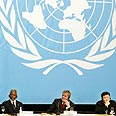
Why do we bother?
The Jewish community and the U.N. Human Rights Commission - a match made in...
For decades, observers inside and outside the Jewish community have said the United Nations is an organization that has fallen short in carrying out the mission stated in its charter, that it has failed to promote peace and even tolerated terror.
They point to its costly and bloated bureaucracy. They cite the General Assembly’s built-in Arab-led majority, which could probably draft a resolution stating that the world is square and have it pass by a vote of something like 94-4, with some European states abstaining.
And yet, year after year, representatives of B’nai B’rith and other Jewish organizations go to Geneva to witness one of the UN’s most offensive and discouraging exercises: the meetings of the Human Rights Commission, which opens its deliberations this week.
In the past, this body has been chaired by serial violators of human rights like Libya, and staffed by others like Sudan and Cuba. Invariably, Israel is placed in the dock in the court of public opinion, tried and impugned by an unsavory coalition of extreme leftists and rightists, eager to divert attention from real human rights abuses by scapegoating a free democracy, the world’s only Jewish state.
So why do we bother going?
We go because the prestige that the United Nations and its Commissions enjoy is impossible to ignore. In Europe, where the belief in the value of international legal structures and institutions is virtually sacrosanct, we cannot afford to remain silent when Israel is ritualistically and unjustly condemned.
Inherent injustice in being judged by rights violators
We go because someone needs to point out that the commission betrays its ideals by coddling dictators, and that it perverts the human rights agenda by maligning Israel.
The injustice inherent in being judged by a tribunal that includes some of the world’s worst violators of human rights is so profound that we dare not ignore it.
As leaders of the Jewish community, we can call attention to this grotesque imbalance, to the whitewashing of monstrous atrocities, to the combination of diplomatic cowardice and anti-Zionist bigotry that the Commission demonstrates each year.
It is especially outrageous, and destructive, that the routine of lobbing negative resolutions against Israel is to be repeated precisely at a time of hope and progress in the Middle East, with democratic values beginning to take root in the Arab world, a new Palestinian leadership pledging to disavow terror, and Israel preparing for unprecedented peace concessions.
The year-in, year-out bashing of Israel is, in effect, “formaldehyde diplomacy” - with the Human Rights Commission seemingly in a time warp and oblivious to the important changes taking place outside the Palais des Nations in Geneva, the imposing building in which it conducts its deliberations.
Little hope of reform
We go to Geneva each year because often no one else will stand up and say that the commission, as currently constituted, is in desperate need of reform.
We are going to Geneva this year to underscore the particular absurdity of engaging in uncontrolled and one-sided demonization of Israel just as Israel prepares to make major concessions for peace, and just as there are moves to more what we hope will be more responsible leadership and the stirrings of democracy in the region.
There is, frankly, little hope that the commission will change its pattern of frenzied Israel-bashing this year. Once again, the usual number of anti-Israel resolutions will be introduced, including one on “Human Rights Violations in the Occupied Territories, including Palestine,” which doesn’t take into consideration either unmet Palestinian commitments to end violence and incitement, or the recent advances in the region itself.
And there is more. Reports by Special Rapporteurs will gratuitously criticize Israel without examining Palestinian actions. The resolution on religious intolerance fails to mention anti-Semitism - but does mention Islamophobia.
Yet even if this year brings more disappointment, we can begin to plant seeds of change that may bear fruit in later years.
We go to Geneva each year in the hope of fostering a more fair and productive UN, one where the language of human rights is not invoked only to mask violations of these rights. By protesting the misconduct of the Human Rights Commission while continuing to work within the system, we can express our dismay over current failures while striving to create international institutions that are truly just and equitable.
The vocal participation of the Jewish community is more necessary than ever before - even as its task seems ever more thankless.










